Everything You Need to Know about Windows 10 Safe Mode
When a software issue or bug occurs on Windows, the first thing you can do is entering the Safe Mode to do troubleshooting. However, most people still do not understand what it is exactly. Since Windows 10 is the most popular OS version of PCs, this article will explain how to boot into Safe Mode on Windows 10. So that you can fix a variety of errors, like your PC crashing suddenly, black screen, and more.

In this article:
Part 1. How to Boot into Safe Mode Windows 10 Without Login
It is a bit complicated to boot into Safe Mode on Windows 10 without login. From this point, we suggest you reset your old password with imyPass Windows Password Reset and then boot your PC into Safe Mode properly.

4,000,000+ Downloads
1. Remove the old password if you forgot your Windows 10 password.
2. Reset the Windows password without any restriction.
3. Change current accounts or add new accounts.
4. Available to both administrators and users.
5. Support Windows 11./10/8/7.
Here are the steps to boot into Windows 10 Safe Mode without login:
Create a bootable medium
Open Windows Password Reset after you install it on an accessible PC. Then insert a blank DVD or an empty USB flash drive into your machine. Click Burn CD/DVD or Burn USB to make a bootable medium.
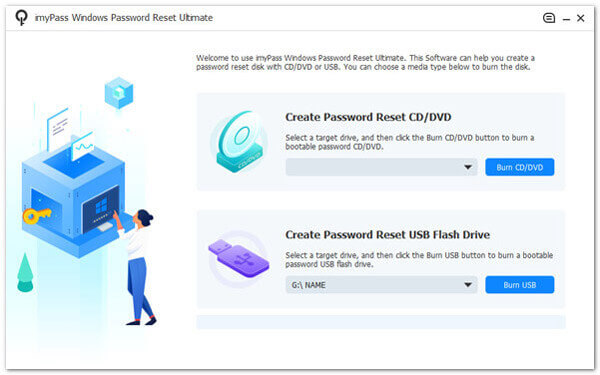
Run Windows Password Reset
Insert the bootable medium into your PC and power it on. Window Password Reset should open automatically. If not, enter the Boot Menu, select the right choice, and restart your PC. If you are using a bootable DVD, for example, choose CD-ROM Drive.
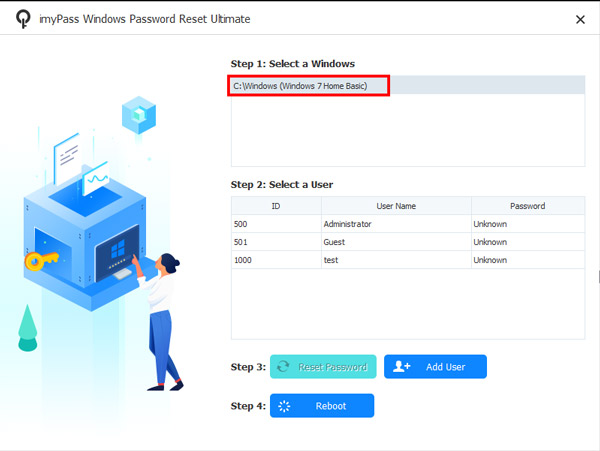
Reset Windows 10 password
Next, select your account, and click Reset Password. If prompted, confirm your action, and enter the new password. Hit the Reboot button.
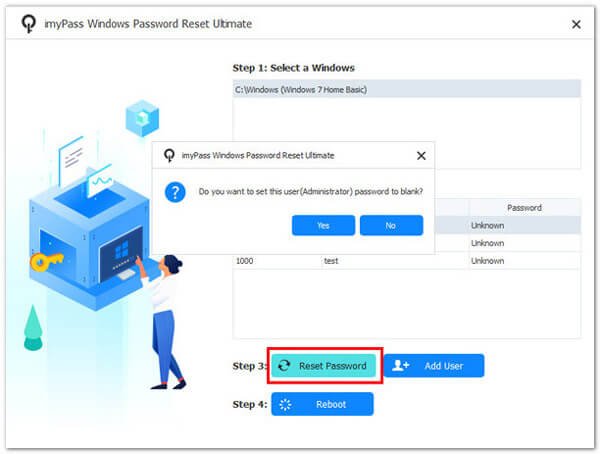
Boot into Safe Mode on Windows 10
Power on your PC, and sign in with the new password. Keep pressing the Shift key on your keyboard while clicking the Start menu, pressing the Power button, and choosing Restart. Then choose Troubleshoot, Advanced options, and then Setup Settings. Click Restart and follow the instructions to enable Safe Mode.

Part 2. How to Start Windows 10 in Safe Mode
Method 1: Boot into Windows 10 Safe Mode on Sign-in Screen
If you cannot log in to Windows 10, hold down the Shift key on the Sign-in screen click the Power button, and choose Restart.

Then navigate to Troubleshoot, Advanced options, and Startup Settings from the Choose an option screen.
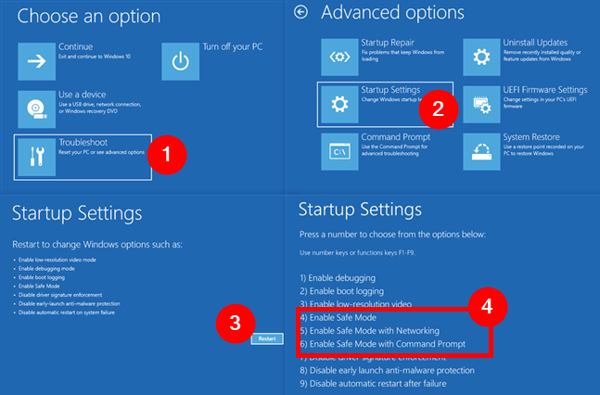
Hit the Restart button on the Startup Settings screen. Then press F4, F5, or F6 on your keyboard to boot in Safe Mode on Windows 10 without login.
Method 2: Start Windows 10 in Safe Mode from Settings
Go to the Start menu at the bottom left corner, search, and open the Settings app. Or press the Windows + I buttons on your keyboard to open it.
Choose Update & Security, head to Recovery, and click the Restart now button under Advanced startup.
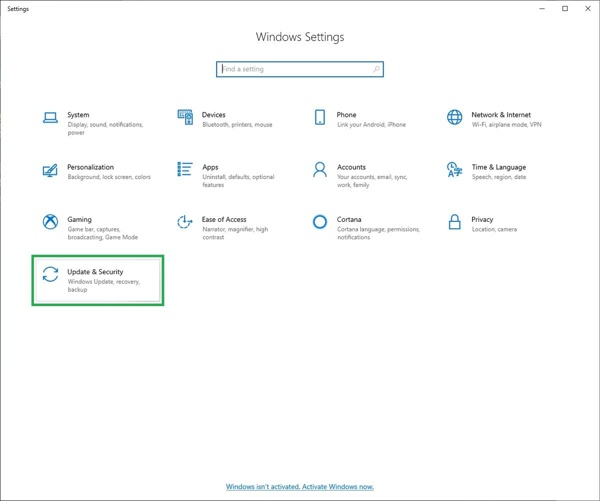
Then you will be presented with the Choose an option screen. Click Troubleshoot, Advanced options, and Startup Settings successively.
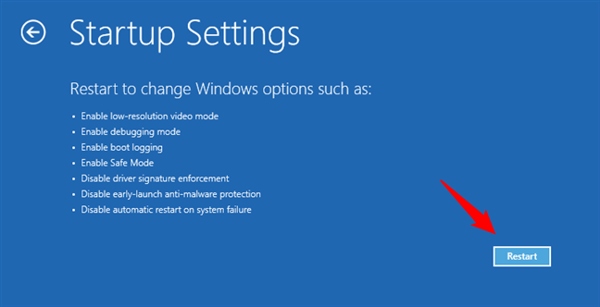
Click Restart and press the proper button on your keyboard to enter Safe Mode.
Method 3: Boot into Safe Mode on Windows 10 from a Black Screen
Interrupt the normal boot process three times. For instance, press the Power button to stop the booting process before it finishes loading Windows 10.
Then your PC will enter the Automatic Repair mode. Wait for Windows to diagnose your machine.
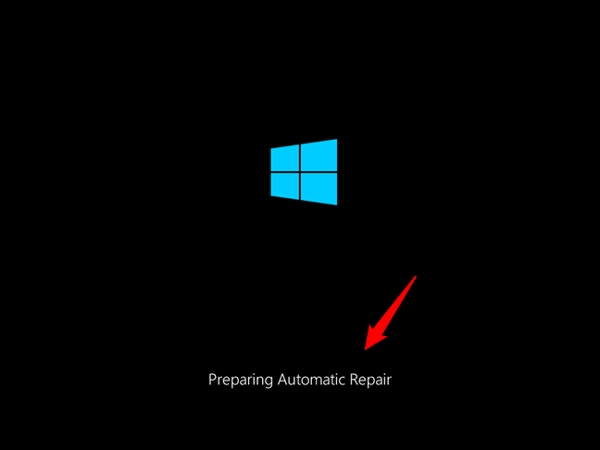
When the Automatic Repair screen pops up, click the Advanced options button. Then you will be taken to the Choose an option screen.

Follow the path Troubleshoot, Advanced options, Startup Settings, and Restart. Then press F4, F5, or F6 to boot into Safe Mode on Windows 10 without login.
Method 4: Boot into Safe Mode on Windows 10 with the Command

In order to start Windows 10 in Safe Mode for troubleshooting, open a command prompt window with an administrator account. You can open it from the Start menu.
Type shutdown.exe /r /o and press the Enter key on your keyboard. After sign-out, Windows will shut down within a minute.
As long as Windows restarts, you will be presented with the Choose an option screen. Then go to Troubleshoot, Advanced options, Startup Settings, and click Restart. Press F4 to enter Safe Mode on Windows 10 immediately.
Method 5: Start Windows 10 in Safe Mode via MSConfig
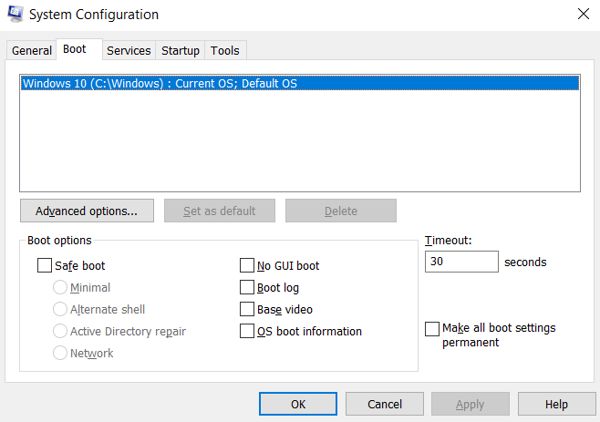
Press the Windows + R keys on your keyboard to open the Run dialog. Input msconfig and hit the OK button to open the System Configuration window. Or search for system configuration in the Start menu, and open it from the result.
Go to the Boot tab, check the box next to Safe boot and select Minimal, and click the OK button.
Then Windows 10 will ask you whether to restart your PC or exit without restart. Click the Restart button to start Windows 10 in Safe Mode.
Part 3. How to Turn off Safe Mode
There are a few ways to boot into Safe Mode on Windows 10. Of course, the method to turn off Safe Mode is different depending on how you enter the mode on your Windows 10 computer or laptop.
How to Exit Safe Mode If You Use MSConfig
Press Windows + R keys to open the Run dialog.
Input msconfig and hit OK.
Uncheck Safe boot in the Boot tab, and click OK. Then click Restart to exit Safe Mode and boot into normal Windows.
How to Turn off Safe Mode If You Used Other Ways
If you start Windows 10 in Safe Mode from the Choose an option screen, go to the Start menu, choose the Power button, and click Restart. Then your PC will turn off Safe Mode automatically.
Related Readings:
FAQs.
-
Why Safe Mode is not working on Windows 10?
The main reasons that you cannot boot into Safe Mode on Windows 10 include:
1. Your PC is infected by a virus or malware.
2. Your system disk is broken or damaged.
3. The system files involved with Safe Mode are deleted or removed.
4. The method or process to enter Safe Mode is wrong. -
Can I enter Safe Mode with F8?
No. With the advent of SSD drives and fast boot, the option to F8 into Safe Mode was eliminated because it could not be done quickly enough to register.
-
What happens when Windows 10 boots into Safe Mode?
When you start Windows 10 into Safe Mode, your machine only loads the operating system with a minimal set of system files and device drivers.
Conclusion
Now, you should learn at least six ways to boot into Safe Mode on Windows 10 with or without login. You can pick an appropriate method and follow our steps to enter Safe Mode quickly. If you forgot your password, imyPass Windows Password Reset is a good option to recover it. Even if you boot into Safe Mode without login, you still need to log in to your account after troubleshooting. More questions? Please feel free to write them down below.
Hot Solutions
-
Windows Tips
-
Windows Password
-
Fix Windows
-
Password Tips

